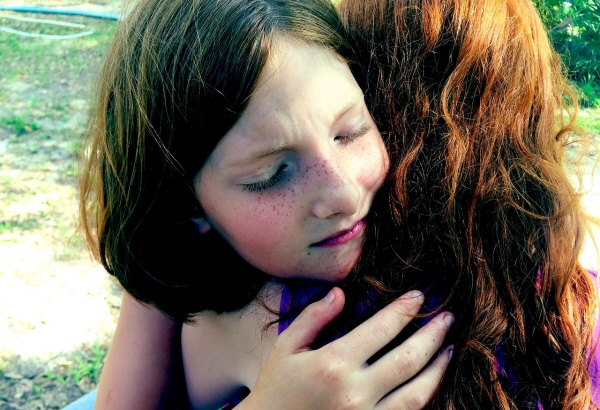Most of us remember the day we brought our children home from the hospital, it was likely the most monumental yet terrifying day of our lives. Did you find yourself asking where the instruction manual was? Each new chapter of parenthood seems to trigger this wish all over again, leaving us wanting that answer manual. We just want someone to tell us what to say and how to say it. Helping our children cope with grief is one of those situations. The truth is, as we know, every child is different, so their needs are unique too. There is no one way to prepare children for the death of a loved one. It’s difficult, no matter what. We do have a few suggestions to help you begin: 1) how to start the conversation 2) recognizing there are different ways children mourn 3) how we can help children move forward. These are only suggestions; the most important thing to remember is that no person, blog, or book knows your child better than you do. Trust your gut and use these guidelines to get the conversation started.
Communication
A recurring question we are asked is, “How do I tell my child so-and-so has died?” Regardless of the child’s age, it is really important to create a safe and open environment for the dialogue to take place. Use terminology best suited for the age of your child. This might be an appropriate time to teach children your personal or spiritual beliefs in regards to death. Allow your child to ask questions and let their voice be heard. Don’t do all the talking. Remember that there is no such thing as a silly question. Dr. Alan Wolfelt (grief counselor) counsels us to not be afraid to use words like “death” and “died.” (1) Death is something every single one of us will experience. While it may not be an enjoyable subject to talk about, it is a necessary one.
Ways that children mourn
Dr. Wolfelt says; “Any child old enough to love is old enough to mourn, but their mourning often looks different than ours.” (2) Just as adults express their grief differently, so will children. Some will cry and be sad and then ten minutes later be back to playing with their toys. This can be difficult for adults to understand because when we grieve it is often very difficult for us to focus on anything except our grief. According to Dr. Wolfelt, children are different in that they grieve in short spurts. (3) Children are wonderful, honest communicators but they often communicate through their actions instead of their words. Be present and pay attention to any drastic changes in their behavior. Their behavior will be a great indicator of how they are processing their grief. From our perspective we have noticed, in the beginning, especially, it may be difficult for children to understand the concept of permanence. Don’t be surprised if weeks down the road they ask if Grandpa is coming over for dinner, even though you have had numerous conversations about his death. As time goes on they will come to grasp what the concept means, continue with patience and explain it to them as many times as it takes. Mourning is a natural and necessary step in the grieving process. Be patient with yourself as well as your children as you all progress through it. In our experience as funeral directors, we have seen that there is no specific timeline to process the death of a loved one, it is individual for each person. Though you will never move on, you will move forward, one day at a time.
How do we move forward?
What does life look like after losing a pivotal member of your family unit? This is a question no one wants to imagine. We see people days, weeks, months, even years after their loved one has died and we are constantly asked when this pain will end. The truth is, it won’t. No one ever fully moves on. The good news is, they do move forward. Children are the greatest examples of moving forward. Their resilience is astounding. We believe one of the best things adults can do to aid children in moving forward is to help them maintain their routine. As many parents know structure is critical in helping children maintain clear boundaries. Clear boundaries help children regulate their emotions and regulated emotions aid in healthy, happy, well-adjusted children. Do your best to continue forward with previous schedules, allowing for occasional interruptions when appropriate. Take things moment by moment, day by day, one foot in front of the other. Soon enough days grow into weeks, and months, and years, whose moments slowly push out the pain, finding ways to mend the hole left in your heart.
For more grief resources please visit our Children & Grief page. For information about East Lawn’s services submit a contact form and we will get back to you right away!
Author: Jessica Harston | Funeral Director at East Lawn Mortuary – FD # 1242
References: 1, 2, 3, https://www.centerforloss.com/grief/like-help-someone-grieving/



